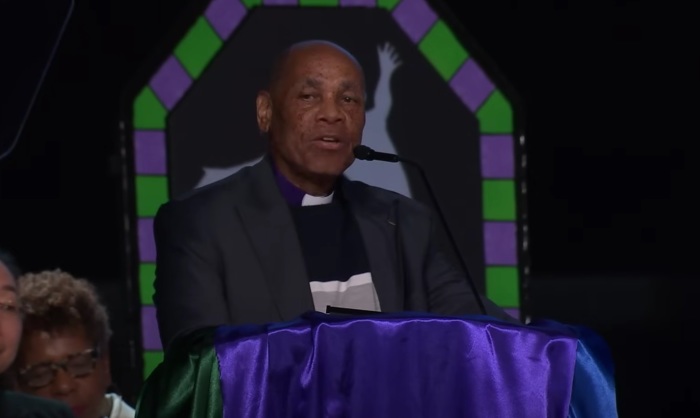UMC bishop detained in Nigeria over visa dispute amid Church leadership debate

A United Methodist Church bishop has been detained in Nigeria, reportedly over a visa dispute, as he traveled to the country amid a debate over who controls the regional denominational body.
Bishop Eben Nhiwatiwa of Zimbabwe was detained last Friday by the Nigeria Immigration Service while meeting with members of the UMC Southern Nigeria Annual Conference, The Herald reported.
At issue was the effort to establish new leadership for the Nigerian Episcopal Area amid disputed claims over whether the regional body is still affiliated with the UMC.
Local UMC leaders called for the release of Nhiwatiwa and alleged that those within the Nigerian Episcopal Area who wanted to leave the UMC were behind the arrest, reported The Herald.
A government official told Sahara Reporters that Nhiwatiwa was detained because “he was found doing religious business with a visit visa,” which is prohibited under immigration law.
“We arrested him following an information that he was presiding over a church meeting with the aim of electing a new bishop,” continued the official. “And it is prohibited to perform any religious duty with a visit visa. He required a religious visa to function as such.”
Another factor in Nhiwatiwa's detention was his representation of a “faction” believed to be in support of same-sex marriage, which is illegal in Nigeria, as is belonging to any group that advocates for it.
“Again, we gathered he was in the country to supervise the election of a new bishop for a faction of the church which believes in same-sex marriage,” the official also told Sahara Reporters. “And we all know that our laws have outlawed same-sex marriage. So basically, he deceived our embassy in his country, because I think he knows the difference between the two visas.”
Earlier this year, after decades of debate over the issue, the UMC voted overwhelmingly at its General Conference to remove language from the Book of Discipline prohibiting the blessing of same-sex marriages and the ordination of clergy in same-sex relationships.
The votes came after approximately 7,500 mostly conservative congregations had left the denomination over the debate, with most joining the nascent theologically conservative Global Methodist Church.
In July, Nigerian Bishop John Wesley Yohanna sent a statement to Nigerian state officials explaining that, at a special called session held earlier that month, the regional body had voted to leave the UMC and join the GMC.
“Therefore we want to make a statement that since the church has derailed from biblical principle we cannot be in this church where … homosexuality can be celebrated,” Yohanna stated.
However, a group of Nigerian UMC officials released a statement disputing Yohanna’s claims, arguing that only the former bishop and about 10% of the regional body had left the UMC.
“Even though we are saddened by their exit, we hold them in our prayers and wish them God’s guidance in their newfound faith community,” read the statement. “We also wish to make it categorically clear ... that our denomination does not permit them to leave with any of the United Methodist property in the way.”
On Aug. 1, the UMC named Nhiwatiwa, along with bishops Patrick Streiff and John Schol, to serve as an interim team to lead the Nigerian Episcopal Area through December, when new leadership for the regional body would be appointed.
The GMC has maintained that the Nigerian church body has affiliated with their denomination, with Transitional Connectional Officer Keith Boyette telling CP in an earlier interview that their information on the issue “came directly from those in positions of authority on the ground in Nigeria.”
“They informed me that unanimous votes were taken at the duly called special sessions of each of the four annual conferences in Nigeria to withdraw from The United Methodist Church and to align with the Global Methodist Church,” Boyette explained.
For their part, the UMC directed CP to a letter by Schol, which claims that “[s]everal hundred congregations and clergy have already communicated that they will stay with The United Methodist Church.”
“There are reports that Annual Conferences were held, and Conferences voted to leave The United Methodist Church. This is not true,” wrote Schol. “There were no Conference Sessions convened according to our Book of Discipline, and most delegates/conference members were not invited to these gatherings.”
Schol also expressed concern over reports that some UMC officials in Nigeria had been arrested due to their refusal to leave the denomination, comparing them to “Peter and John in the Book of Acts and the Apostle Paul who were arrested because of their humility and conviction.”




























